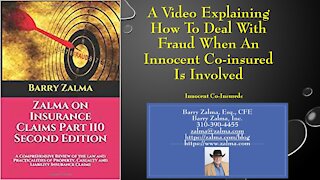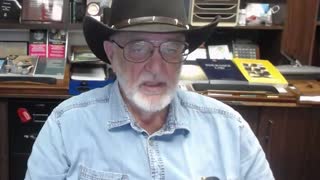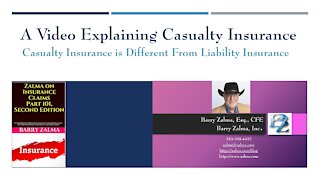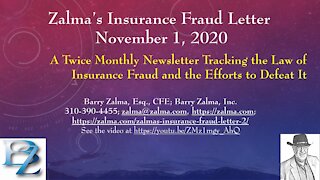Premium Only Content

A Video About a Conviction for Insurance Fraud
Insurance Fraud as a State Crime People v. Murphy
People v. Murphy, No. E046742 (Cal.App. Dist.4 12/28/2009)
A jury convicted defendant Melissa Kay Murphy of procuring or offering false information for filing (count 1—Pen. Code, § 115, subd. (a)), insurance fraud (false claim) (count 2—Pen. Code, § 550, subd. (a)(4)), and insurance fraud (false statement) (Pen. Code, § 550, subd. (b)(1)). The court granted defendant three years of formal probation on various terms and conditions including service of a 180-day jail term. On appeal, defendant contends she was improperly convicted of the felony offense of procuring or offering false information for filing in count 1 because that offense was preempted by more specific recently enacted misdemeanor offenses. In addition, defendant maintains that the trial court erred in failing to give a sua sponte jury instruction in connection with count 2 that the jury was required to find defendant was not entitled to receive payment for the loss she made a claim for. We affirm the judgment in full.
Defendant contends that a claim not paid under the misrepresentation clause cited above is not paid because the insured made a false statement in that claim, not because the insured filed a false claim. Thus, she asserts that the People are ignoring the distinction between making a false claim for payment and a false statement in support of a claim, both being separate offenses for which she was convicted in this case. However, the exclusionary provision of the insurance policy at issue requires that the insured make a misrepresentation regarding a “material fact or circumstance;” thus, an insured could be convicted under Vehicle Code section 550, subdivision (b)(1), for making a false statement in connection with an insurance claim which was not “material” and still have a valid claim. On the other hand, here, where defendant’s fraudulent statements bore on the material facts and circumstances regarding the claim, her filing of the claim was invalid. Thus, convictions would be proper in both counts because defendant made false statements in connection with an insurance claim and made material misrepresentations regarding the facts of that claim such that her claim was invalid. Moreover, even if we agreed with defendant’s interpretation of the requisite findings for a conviction on count 2, we find that her contention is subsumed within the elements as presented in the instructions as given. CALCRIM No. 2000 more than adequately conveyed to the jury that it was required to find that defendant made a fraudulent insurance claim, payment of which she was not entitled to receive.
-
 8:57
8:57
Barry Zalma, Inc. on Insurance Law
1 year agoNo Coverage for Benefits no Right to Bad Faith Damages
199 -
 15:10
15:10
Barry Zalma, Inc. on Insurance Law
4 years agoA Video Explaining how to Deal with Insurance Fraud and Innocent Co-Insureds
79 -
 15:14
15:14
Barry Zalma, Inc. on Insurance Law
4 years agoA Video Explaining What Every Insurance Professional Needs to Know About Negligence
123 -
 16:42
16:42
Barry Zalma, Inc. on Insurance Law
4 years agoA Video Explaining Casualty Insurance
76 -
 0:16
0:16
Pshava
4 years ago $0.14 earnedvideo about a cat
1.02K8 -
 0:11
0:11
Gost
4 years ago $0.03 earnedBeautiful video about nature
5096 -
 15:23
15:23
Barry Zalma, Inc. on Insurance Law
4 years agoZalma's Insurance Fraud Letter - November 1, 2020
223 -
 4:01
4:01
IOL-IndependentOnline
4 years ago $0.06 earnedMusic video: WHAT ABOUT THE PEOPLE?
3.35K1 -
 15:42
15:42
Barry Zalma, Inc. on Insurance Law
4 years agoZalma’s Insurance Fraud Letter – October 1, 2020
55 -
 17:29
17:29
Barry Zalma, Inc. on Insurance Law
4 years agoA Video Explaining the Nature of Insurance Underwriting
36